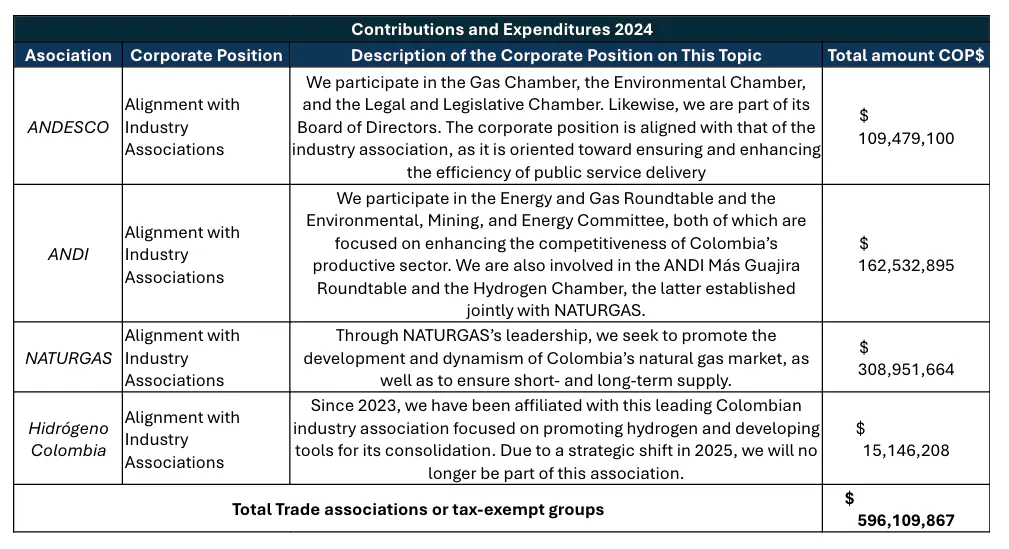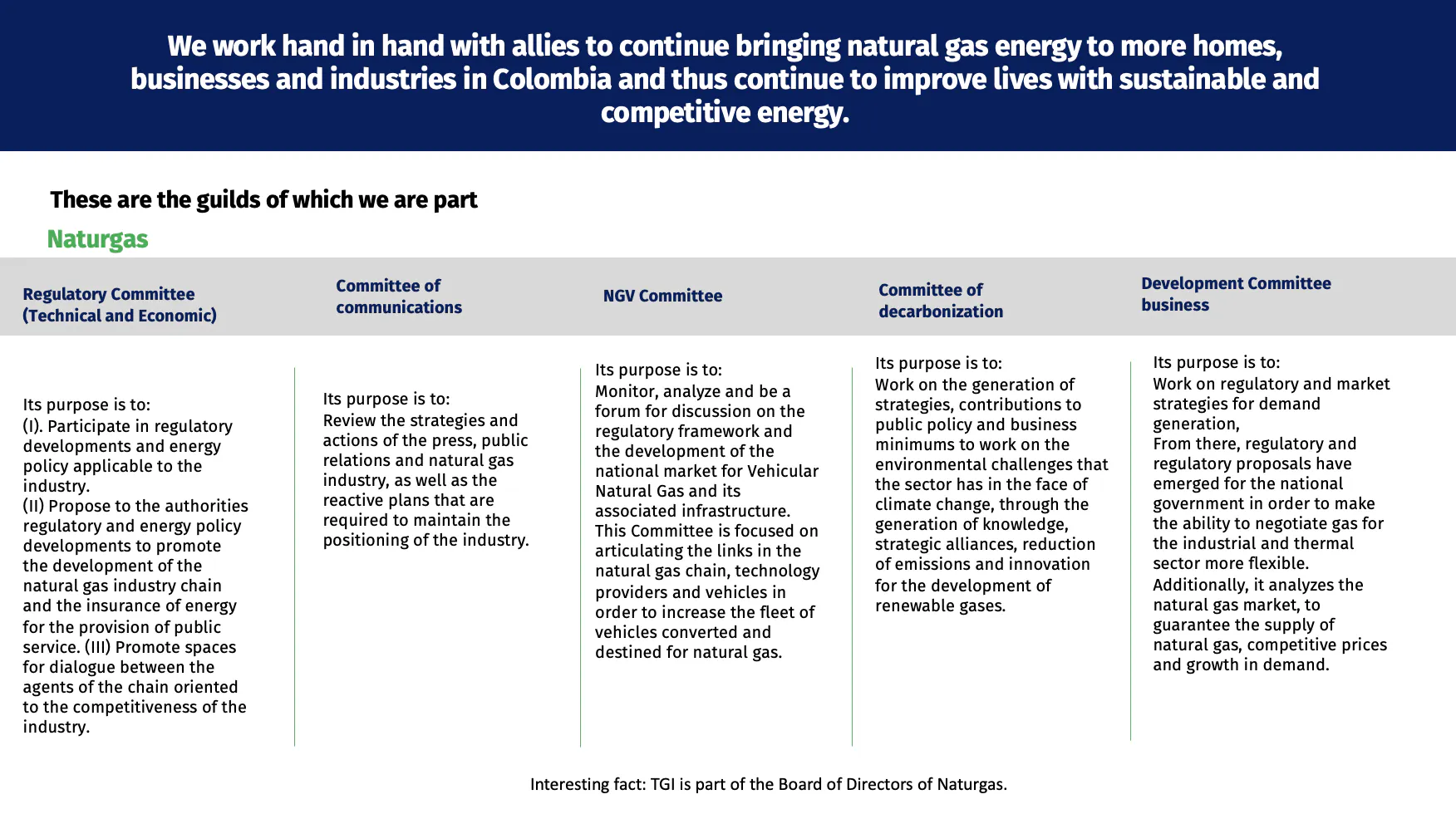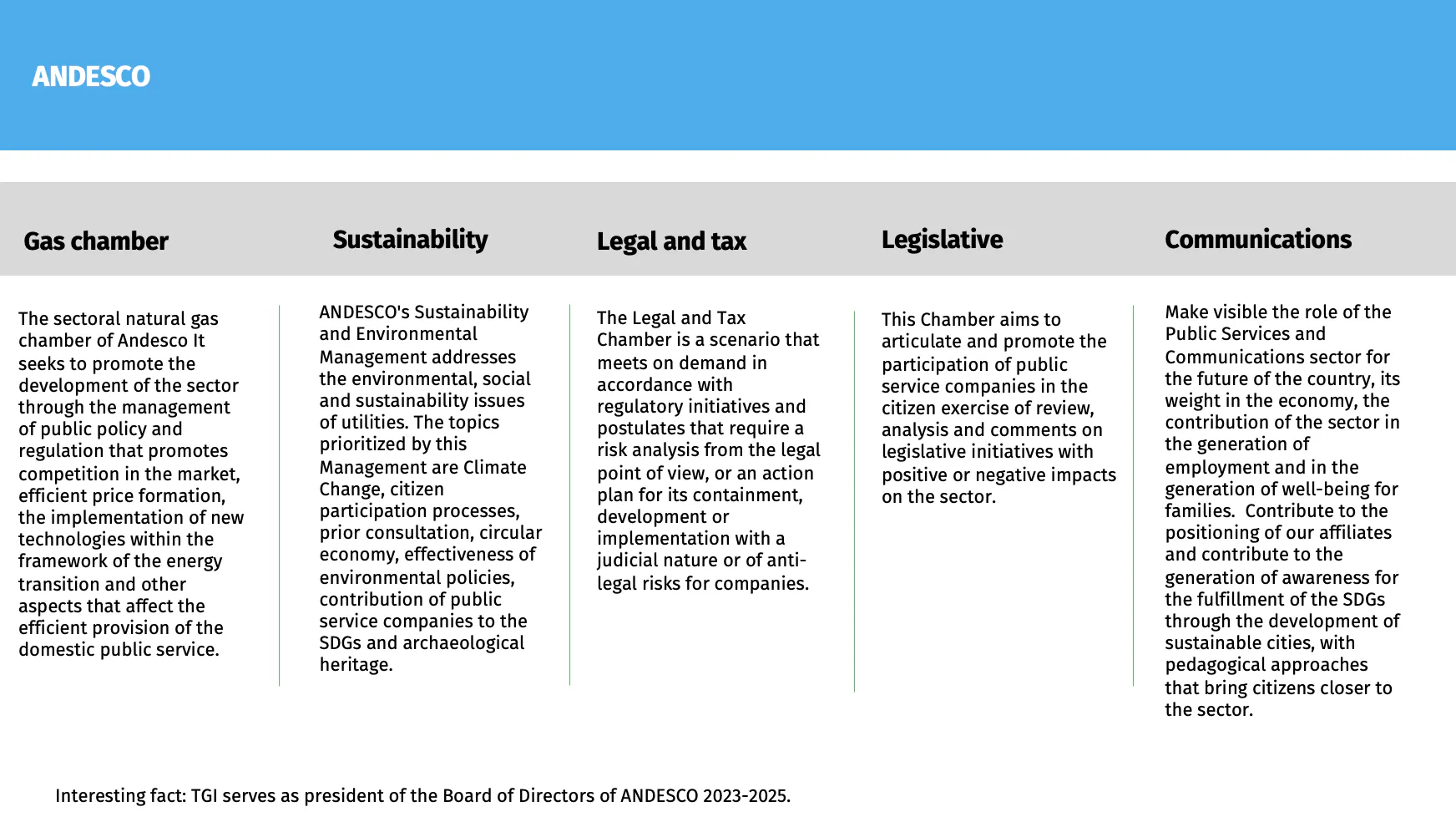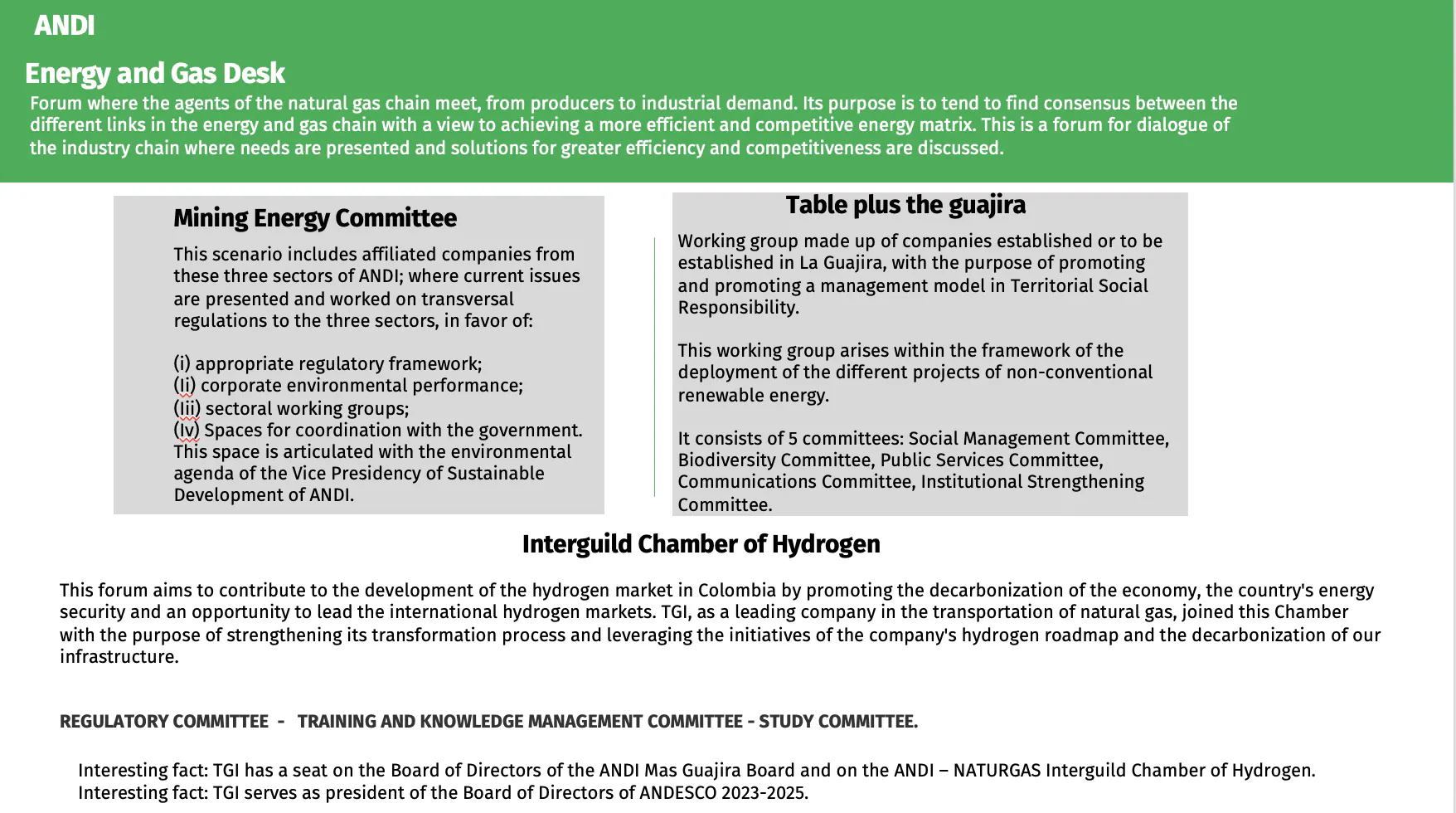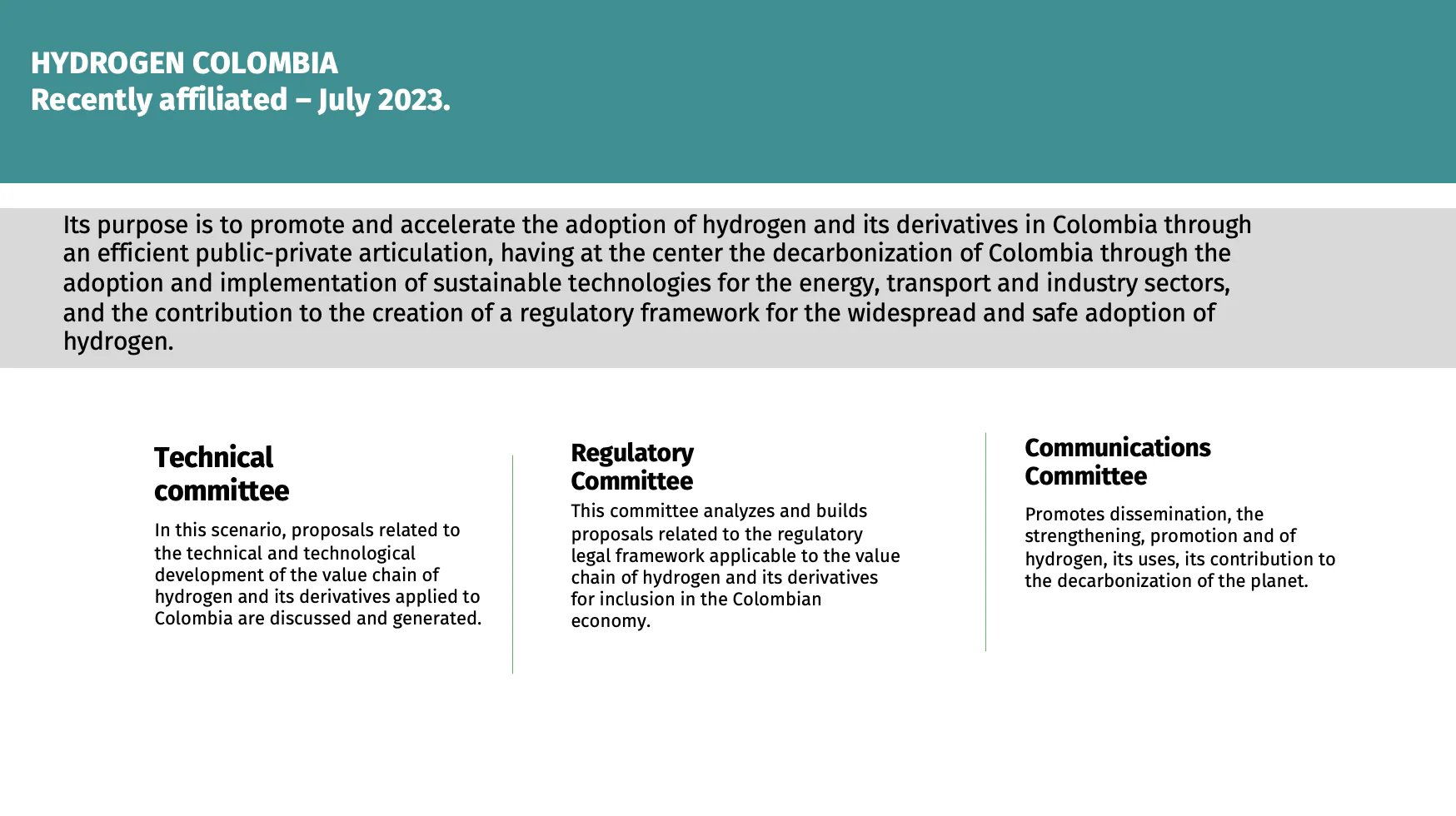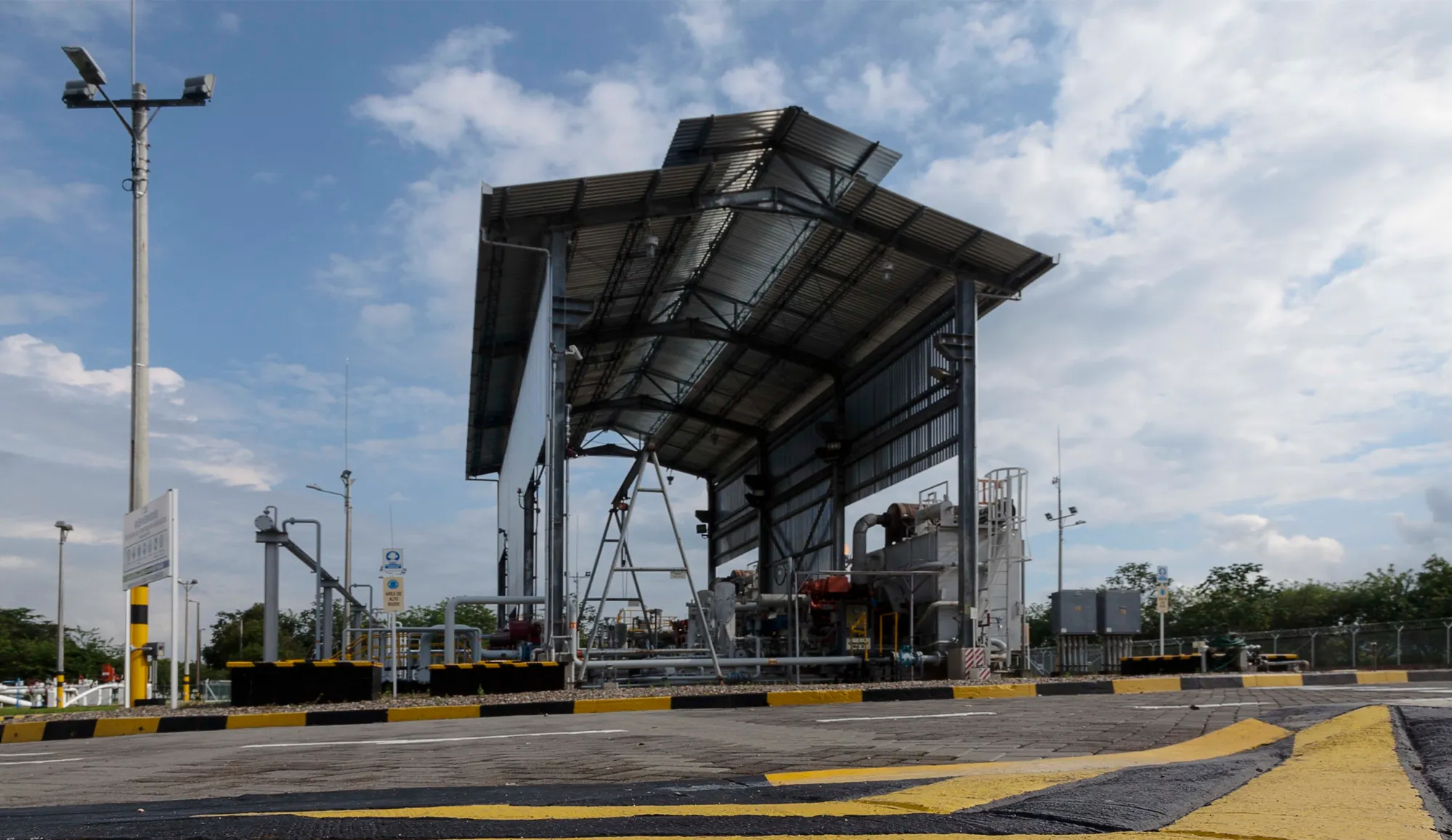
Relationship between government entities and trade union organizations
Seeking to consolidate a relationship with mutual benefits that, in turn, generates synergies and provides an adequate and timely response to the requirements of our stakeholders, at TGI we have a relationship guide that allows us to identify material matters of interest and fulfill the purposes of Informing, Forming, Feedback and Positioning.
Regarding the stakeholders as government entities and trade organizations, the relationship strategy allows us to plan, articulate and manage initiatives that are aligned with the sustainability of the business and its corporate commitments, through the consolidation of constructive and lasting relationships, where TGI is positioned as an ally for the energy transition, the decarbonization of the energy matrix and carbon neutrality. as well as for the promotion of innovation and development.
For a relationship based on the joint construction of opportunities to face the governance challenges that concern society as a whole and that are especially relevant for TGI, we are committed to participating in a timely and proactive manner in institutional and union spaces aimed at the construction of public policies that allow us to overcome the challenges that climate change and social gaps demand of us.
At TGI we recognize the importance of being part of commercial organizations that are committed to increasing the social, environmental, and economic contribution of companies from climate action, research and development, energy transition and socially responsible practices. In particular, the guilds of which we are part contribute to the corporate objectives outlined in the pillars of Regulation, Expansion, Transformation and Climate Change Management.
Our management is aligned with the Paris Agreement.
TGI's sustainability strategy recognizes the importance of government and union relationships to manage our corporate risks in a timely manner. The risk implied by climate change and opportunities are essential in our material matters of relationship and issues to be prioritized in the corresponding union spaces.
The Roadmap for Decarbonization approved in 2022 declares TGI's commitment to the energy transition and adds to the country's commitment to be carbon neutral by 2050. It is this commitment that feeds the agenda of our corporate action in terms of relations with the different government and trade interest groups, and that is reinforced through the management carried out by the commercial organizations of which we are a part.
Alignment of TGI's management of its trade union activities and these with the Paris Agreement.
TGI ensure that action on change is consistent and solid in the guilds where it participates through its permanent and proactive linkage in the agenda of the environmental, sustainability, and decarbonization committees and the projects, public policy initiatives that are developed through them.
The trade organizations to which we belong are aligned with the Paris Agreement:
ANDI
ANDI, in the creation of the decarbonization and green growth committee, recognizes that "The productive sector has been advancing for decades multiple individual and collective initiatives, which create value, but the urgency and scale of the solutions necessary to face climate change and other challenges, requires not only strengthening joint work, but also taking advantage of the opportunities for a just transition. with the purpose of creating new opportunities for growth, employment and new markets, and consolidating the competitive advantages that the country has to move towards a low-carbon economy".
"The goal set in the Paris Agreement to limit the temperature increase to 1.50C compared to the pre-industrial era is increasingly distant and for many scientists it is already unattainable given that the pace of emission reductions does not allow it and the lack of political consensus among countries hinders it." In response to this challenge, "recognizing the risks and high challenges, the new National Committee relaunches its work, with the commitment and proactivity of its founding companies, and this time with the purpose of leading and accelerating, together with society and government, the decarbonization and green growth of the nation."
See document: "National Committee for Decarbonization and "A Low Carbon Footprint: The New Competitiveness" Available here
NATURGAS
Naturgas leads the natural gas sector alliance: "Road to carbon neutrality", which aims to consolidate and strengthen the implementation of actions and good practices within the companies affiliated to NATURGAS to contribute to the country's commitments to carbon neutrality in accordance with the commitments assumed by the country within the framework of the Paris Agreement.
See document: Alliance of the natural gas sector.
ANDESCO:
ANDESCO, through its president, has ratified the association's commitment to Climate Change and the need to carry out actions from its affiliates that contribute to the commitments signed by Colombia regarding the Paris Agreement.
In addition, recognizing that environmental issues are essential for the development of sectoral activity at all levels, the Association continuously brings together national and international experts to discuss issues of interest and promotes, through periodic meetings, analysis and reflections on environmental processes, their trends, and developments.
Likewise, we constantly monitor the regulations and legislation related to environmental issues, in order to make the information known to our affiliated companies and accompany its regulation and implementation. In this sense, among the prioritized issues for management we find Climate Change, deploying actions aimed at monitoring and participation in spaces for the regulation of the commitments of the climate action law (Paris Agreement) and socialization of business experiences in carbon credits.
In its implementation we find:
- Articulation table of the E2050 Colombia Strategy of the Ministry of Environment and Sustainable Development.
As evidence of the commitment of the company and the union management to contribute to the country's carbon neutrality, the unions to which we are linked participated in the Articulation Table of the MADS E2050 Colombia Strategy. This initiative laid the foundations for a future that is resilient to climate change, with carbon-neutral development and that is committed to the adaptation of sectors and territories to the effects of Climate Change.
- 2050 Climate Change Management Plan and Comprehensive Business Climate Change Management Plans.
With the leadership of ANDESCO as the energy and natural gas sector, we actively participated in the update of the Climate Change Management Plan (PIGCCme 2050), and the climate change roundtables of the Ministry of Mines and Energy (MME), in which the sector's vision towards carbon neutrality and climate resilience by 2050 was addressed.
This constant management allowed the exchange of practices and experiences of companies in the sector with a view to their own decarbonization. In our case, the Ministry of Mines and Energy visited the Sabana Compression Station where the energy efficiency processes, the decarbonization roadmap and recommendations were generated from the parties for the Plan in question, and the adaptability of the infrastructure.
- AGREEMENT "Biodiversity and Development for the Caribbean: La Guajira Connection".
The agreement to which 5 environmental institutions, the 9 companies that are part of the Mas Guajira Table of ANDI, and the National Center for Water and Biodiversity were linked) allows financial and technical efforts between the public and private sectors to be joined for the implementation of a socio-environmental corridor, the development of initiatives aimed at preservation, connectivity and restoration of strategic continental and coastal marine ecosystems, supports the strengthening of national and regional protected areas in the upper, middle and lower Guajira.
- Carbon footprint measurement
With the leadership of Naturgas, together with other companies in the natural gas chain, a tool is being built to consolidate the carbon footprint of the natural gas industry, understanding that
this guild represents 98% of the natural gas market in the country. The tool and the results will be presented in the 4th quarter of 2023 along with an industry decarbonization plan fully aligned with the country goals based on the Paris agreement.
- Development of carbon-neutral trade events.
The guilds of which we are members have joined the initiative, an event in the forest that has allowed the business congresses they organize to be carbon neutral events, reaffirming their commitment to climate change and contributing to the consolidation of natural ecosystems.
- Incidence in public policy so that as a business sector contribute to the effective fulfillment of the goals established by Colombia to the Paris Agreement.
With the aim of positioning the management of socio-environmental issues on the company's agenda, the Vice-Presidency of Government and Environment Affairs has strengthened the monitoring, analysis and contribution to legislative initiatives and socio-environmental regulations from a technical-legal review, under a strategic and technical perspective, anticipating possible scenarios for action and adaptation to global trends.
In this sense, the union agenda aligned with corporate priorities has focused on influencing the mechanisms for the implementation of the Escazú Agreement, prior consultation, regulatory adjustments to environmental procedures, construction of sectoral goals for compliance with the Paris agreements, implementation of Law 2173 of 2021.
Also, within the framework of the Hydrogen Chamber, work has been carried out together with the National Government on the regulatory framework that allows the development of the hydrogen chain in the country and the transformation of the sectors, through alliances with the cooperation agency, companies, and the government.
